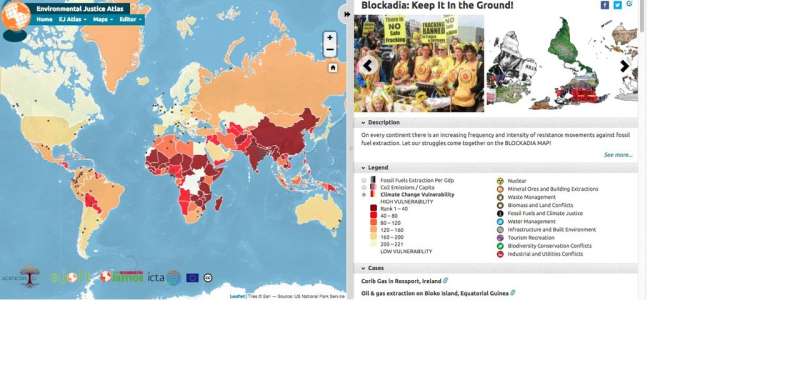Blockadia map reveals global scale of anti-fossil fuel movement

A new interactive map by researchers of the Institute of Environmental Science and Technology of the Univesitat Autonoma de Barcelona (ICTA-UAB) reveals the worldwide impact of direct resistance actions by people putting their own bodies in the way of fossil fuel projects in phenomena called blockadia.
The blockadia map brings together a selection of 50 cases of resistance movements against fossil fuel extraction compiled by the Environmental Justice Atlas (EJAtlas) (www.ejatlas.org), a worldwide inventory of ecological distribution conflicts.
The blockadia map shows the global nature of direct actions for climate justice. The map's researchers from the ICTA-UAB, Lund University, Sweden and Universidad del Magdalena, Colombia, found that in most cases, a blockadia action starts with protecting land and livelihood, but grows into something bigger when outside support and a climate justice narrative are added into the mix. Researchers point out that indigenous peoples have been the first and fiercest opponents in almost all contested fossil fuel projects.
"Blockadia" is a term popularised by Naomi Klein after it was used by activists against the Keystone XL Pipeline from the Alberta Tar Sands. It describes the "roving transnational conflict zone" in which people are stepping in where leaders are failing.
ICTA-UAB researcher and ENVJUSTICE project leader Professor Joan Martínez-Alier says that "the fight against climate change requires that a large percentage of the recoverable fossil fuels remain in the ground. These are the so-called 'unburnable fuels.'" Martinez-Alier explains that some of the activists from communities and organizations from across the world have paid with their lives.
Daniela Del Bene, researcher at ICTA-UAB and member of the XSE-Energy Sovereignty Network, Barcelona says "this global analysis also shows that besides the ecological and climate-related impacts, the fossil fuels industry is responsible for serious violations of human rights and environmental regulations."
The map's release coincides with the Peoples Climate March in Bonn this weekend. World leaders will gather on Monday at the UN Climate Change Conference (COP23) to discuss the lack of progress on the already agreed goal to limit greenhouse gas emissions so much that the resulting temperature rise remains "well below 2°C."
Both the World Meteorological Organisation and the U.N.'s environmental body raised the alarm this week about the acceleration of annual greenhouse gas emissions and the associated consequences. Political leaders need to understand that if they do not make bolder moves to mitigate climate change, people take things into their own hands to prevent a climate breakdown. The conversation on climate change is shifting from "what is a legal action to what is legitimate."
More information: Link to the map: ejatlas.org/featured/blockadia
Provided by Autonomous University of Barcelona




















